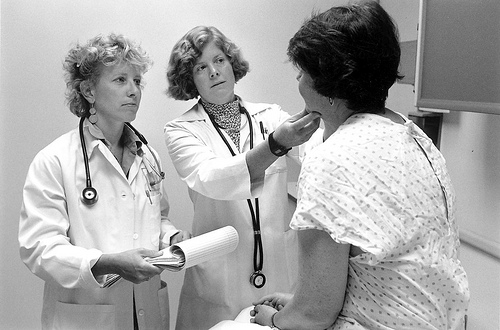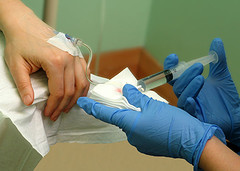How to Be a Hospital Advocate for a Friend or Loved One


What Is a Patient Advocate?
A hospital, health care or patient advocate are terms used interchangeably to describe a person who supports, backs, promotes or is a spokesperson for either his/her own self or for someone else.
In the best sense of the word, an advocate is someone you trust who is willing to act on your behalf, in your best interests in your total health care. Yourself, a friend or loved one can act as an advocate, not only in a hospital setting, but also at doctor visits, with home health care, or in long-term settings such as assisted living or nursing homes.
There are also professional patient advocates, often social workers, nurses, clergymen or other allied health workers who can be hired privately; oftentimes, these professional individuals are titled case managers.
Role of a Patient Advocate
Would You Like to Know More About Patient Advocacy?
- Elder Care Attorneys: Lawyers For Seniors
What an Attorney for senior citizens does may seem obvious, but we need to understand why their services are so important in our complicated society. - Patient advocates can make a difference | UTSanDiego.com
Illness, pain or just the shock of being diagnosed with a serious medical condition can hinder patients’ ability to understand their treatment options or make decisions about their care. Patients may benefit by having another person by their side to - Become a Patient Advocate
- Advocacy
Why is Advocacy Needed? What is Advocacy? Can anyone be an advocate? Just some of the questions that can be answered by reading this article. - How to be a Medical Advocate
A comprehensive guide to compiling a thorough Health History, and being an effective Medical Advocate - for yourself or for someone else. Tips and strategies for optimizing care and treatment. - The Patient Advocate Foundation Offers Free Help To Patients In Need! Consider Putting Them On Your
- 4 Simple Ways for Nurses to Improve Patient Satisfaction Scores
Improving patient satisfaction scores in a healthcare industry that strips its customers of all modesty is a difficult one. Patient satisfaction scores will never reach 100% because of the nature of our work: Providing care to the ill, injured, and d
How You Can Be Effective as a Patient Advocate
It's important to understand that a patient advocate, whether for yourself, a friend or a loved one, is not an adversary to the health care team. The role of the patient advocate is to ensure the best care is given and that decisions reached by the health care professionals is in the best interests of the patient. The best patient advocates have good communication with the health care team and build a relationship of mutual respect and trust.
Individual circumstances vary, based on the patient's health history and experiences, religious or spiritual beliefs, as well as his/her outlook on short and long-term outcomes. For example, you may be advocating for someone with a terminal illness who wishes to spend the rest of his life at home, rather than in a hospital setting. Doctors may advise against this, for whatever reason. If the patient's wishes remain steadfast, it will be your place to ensure the doctor and the health care team begin to plan for the patient's discharge to home.
Strengthforcaring.com, a support site for caregivers, advises that there are questions you can ask as a patient advocate to receive better care for the patient:
- How do we know this is my loved one's diagnosis?
- Is the treatment moving forward towards my loved one's goals?
- Are there new treatments we might consider?
- Are there lifestyle choices that support my loved one's health goals?
- Are there new products and services that could help?
Additional questions and things you can do to advocate for the patient:
- Ask nursing staff about any restrictions on physical activity, diet, and fluid intake for the patient; ask daily if there are any changes in these areas
- Find out what you can do to be involved in your loved one's care
- Keep pen and paper handy to write down questions you or your loved one may have as you think of them. In this way you'll be prepared to ask the appropriate person when you see them. Write down the answers you receive
- Remember that the nurses are a wealth of information. Questions and concerns you may have can be first addressed to a nurse. If an answer or solution can only come from the attending physician, the nurse can either query the doctor on your behalf or suggest you can do so -- whatever makes you the most comfortable
- You may want to keep a journal of daily activities, tests and treatments for future reference
Best Books on Patient Advocacy
Hospital Patient Advocate/Patient Representative
Most hospitals have one or more persons on staff whose job title is "Patient Advocate" or "Patient Representative." The role of the Patient Advocate employed by the hospital is to aid in the solution of problems related to in-patient care, as well as any concerns and unmet needs. These advocates generally work diligently to find both the patient and the hospital solutions and answers that will meet both parties' needs.
If you, as a patient or advocate for a friend or loved one, have any concerns or questions not met by the nursing staff, physicians, or social service staff, it is the hospital's Patient Advocate/Patient Representative to whom you will address those concerns or questions.
When contacting the hospital's Patient Advocate, be sure to put your concern/complaint/question in writing. If your first contact with the hospital's advocate is verbal, follow-up with a note in writing and carbon copy that same note to the head of the department with whom you are having issues, or the hospital director of nursing if you are unsure what department(s) is involved. The note can be on paper or by email; either will serve as proof of your concern and your contact.
This proof may never be needed, but it is better to err on the side of caution. When it is all said and done, the hospital's Patient Advocate is still a hospital employee, and s/he may not be able to find an amenable solution.
Your next step may be to contact your health insurance company, the hospital administrator, a private attorney or seek a professional patient advocate or case manager, depending on the severity and immediacy of the issue.
Patient Advocate Foundation
Earn a Patient Advocacy Certificate Online
If you're interested in learning how to become a patient advocate and online learning works for you, the University of Wisconsin provides patient advocacy classes through the Center for Patient Partnerships through which you can earn a certificate as a patient advocate by attending classes on campus or online.
Patient Advocacy Doesn't Stop at the Hospital Doors
The Robert Wood Johnson Foundation released a study in February 2013 that provides insights into the frequent re-admissions of seniors back into the hospital within 30 days of discharge -- such a common occurrence that 1 in 5 seniors who are discharged from the hospital are back in the hospital within 30 days.
Communication between doctors and nurses and patients was identified as a major factor in these rapid re-admissions and focused particularly on the discharge planning and instructions that precede discharge from the hospital.
In 28 interviews conducted by PerryUndem Research and Communication with both health care providers and patients, a great divide was identified between the two groups. Health care providers feel frustrated that patients say they understand the discharge instructions when they really don't and often fail to follow through with the instructions, including scheduling an appointment with their primary care provider after leaving the hospital.
For their part, patients explained that being in the hospital is an overwhelming and terrifying experience. They feel they are asked to make important decisions while being emotionally and mentally overwhelmed not to mention in pain or under the influence of medications. Discharge instructions are often written in language that is plain to the health care providers, but not to the patients.
Hospitals will need to do more to improve their discharge planning and instructions, but this report points to the very real need for a patient advocate for patients, especially seniors. It is often those older adults who love alone or who have limited financial means who experience the rapid hospital re-admissions, but it is not an issue of means or social support alone.
As an a patient advocate, responsibility needn't stop at the doors of the hospital. Follow-up after discharge, when the patient has returned home, can make the difference in whether that patient continues on the road to recovery or needs to return to the hospital for further care.
Resources
- Strengthforcaring.com - Just for Caregivers - Your Caregiver Hat: Being a Patient Advocate
Your Caregiver Hat: How to Be a Patient Advocate - Case Management Society of America > Consumer
Case Management is a collaborative process of assessment, planning, facilitation and advocacy for options and services to meet an individual's health needs through communication and available resources to promote quality cost-effective outcomes. - Patient Advocate Foundation Welcomes You! - PAF
- Role of the Patient Advocate | National Patient Safety Foundation









